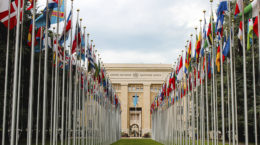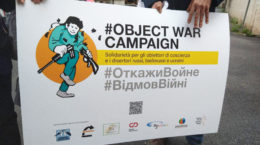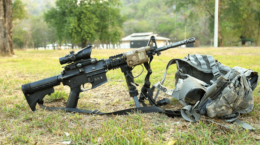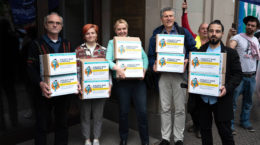The Russian President’s Decree No. 647 of 21.09.2022 “On declaring partial mobilisation in the Russian Federation” effectively deprived servicemen of the possibility to leave military service of their own will while mobilised or under contract. Now they are forced to remain at the front and fight until they are either killed or seriously injured, or until they reach the age limit for military service, or they commit a crime for which they are punishable by imprisonment.
Federal law No. 365-FZ of 24.09.2022 “On amendments to the Criminal Code of the Russian Federation and to Article 151 of the Code of Criminal Procedure of the Russian Federation,” in turn, introduced criminal liability for voluntary surrender and toughened liability for the voluntary abandonment of units and failure to comply with orders. Thus, on the legislative level there are serious obstacles to refusing to participate in the hostilities and exercising the constitutional right to conscientious objection to military service.
The Supreme Court of the Russian Federation enshrined a stricter law enforcement practice in relation to those who surrender. The resolution of the Plenum of the Supreme Court of the Russian Federation No. 11 of 18.05.2023 effectively introduces a presumption of guilt for those who have been taken prisoner.
Another cause for concern are the recent amendments to the federal laws “On military duty and military service” and “On the procedure for exiting and entering the Russian Federation,” which introduce an extrajudicial temporary restriction on leaving the country for conscripts, the confiscation of foreign passports from citizens called up for military service, as well as other restrictions for failure to appear when summoned to the military registration office: a ban on driving vehicles, registering property and financial transactions among others.
Vladimir Putin’s regime has thus established mechanisms to persecute those Russian citizens who refuse to participate in the full-scale invasion of Ukraine and the combat operations on its territory, who try to exercise the right to conscientious objection to military service and who desert or surrender. In effect, this means that the regime has the legal possibility to forcibly send large numbers of Russian citizens to a criminal war at any time.
Obviously, one of the most reliable ways to protect oneself from being sent to war is to leave Russia and travel to safe countries. However, emigration is an extremely complicated process: land borders with EU countries are effectively closed and the simplified visa procedure has been abolished. There are no general guidelines for the protection of conscientious objectors, deserters, people who voluntarily surrender or prisoners of war.
In view of the above, we, the undersigned anti-war initiatives, call on the European Commission and the European Parliament within the framework of their respective mandates and in cooperation with Russian and international human rights and humanitarian organisations to:
1. Consider recognising Russia’s war against Ukraine as a crime against peace to clarify the humanitarian status of Russian conscientious objectors and deserters who, as part of their right to freedom of conscience, refuse to participate in the criminal war.
2. Develop and adopt a unified approach to the provision of international protection for Russian citizens who are under threat of criminal prosecution or are prosecuted for exercising their right to conscientious objection to military service.
3. Develop and adopt a unified approach to the provision of international protection for Russian citizens who were mobilised, conscripted or were serving in the military under contract and were sent to perform military service in military units or in a combat zone on the territory of Ukraine and who:
- declared their refusal to participate in combat operations, to carry out orders related to combat operations against Ukraine, left the place of service (deserted) and are under threat of criminal prosecution or are being criminally prosecuted;
- voluntarily surrendered to the AFU or are already held as POWs, have declared their disagreement with Russia’s military aggression against Ukraine, refuse to return to Russia because they may be criminally prosecuted by the Russian authorities, and are ready to cooperate with the state authorities of European countries and international justice bodies and testify about war crimes committed by the Russian Armed Forces.
4. Develop common guidelines for establishing suitable visa procedures or travel documents for the above categories of Russian citizens for the purpose of their transit to EU countries that are willing to provide them with international protection, including:
- consider adopting common guidelines for a broader application of humanitarian visas and extending the eligibility criteria to the above categories of Russian citizens;
- consider adopting common guidelines on accepting asylum applications from the above categories of Russian citizens at embassies and consulates of EU countries in third countries;
- consider adopting common guidelines on issuing job-seeker visas in the embassies and consulates of EU states in third countries for the legal migration of qualified personnel from the above categories of Russian citizens.
5. Develop mechanisms for providing support, including consulting and financial support, to specialised organisations and initiatives that specialise in evacuating from Russia, creating a network of shelters, legal assistance and other measures to support the above categories of Russian citizens in Russia and third countries.
6. Develop mechanisms to provide financial and humanitarian support to third countries that host a significant number of Russian citizens from the above categories, as well as those who are hiding from conscription and mobilisation, in order to enhance the capacity of these countries to accept and integrate these individuals.
Estimation of the number of those who will need international protection
According to the independent Russian media outlet Mediazona, since the announcement of mobilisation in autumn 2022 until May 2023, around 1500 cases against servicemen were submitted to Russian garrison military courts, consisting of: 1347 cases of unauthorised abandonment of a military unit, 81 cases of not following orders and 26 cases of desertion.
According to estimates from Russian human rights activists, the number of deserters needing international protection should not exceed 1500 people per year. The number of citizens drafted for compulsory military service and who apply for alternative civilian service does not exceed 1500 per year, of which about 47% of applications are rejected. Neither the number of applications nor the percentage of refusals for those mobilised is known.
It should also be taken into account that not all conscientious objectors and deserters who encounter violations of their rights and/or are persecuted will want or be able to leave Russia in search of international protection. Often personal circumstances – financial, family and other – will prevent this. In addition, some refugees will prefer to remain in third countries and will not go to the EU.
As a result, our preliminary estimate of the number of citizens who would need protection under our proposals (excluding prisoners, about whom we have no information) is no more than 2000 to 3000 people per year.
We, anti-war, human rights and humanitarian initiatives, human rights defenders and activists, are ready to cooperate with EU authorities in order to develop a universal and effective approach to the above-mentioned issues. We are also ready to help with the processes of verification, consultation and the development and dissemination of guidelines for those who are fleeing from mobilisation and conscription.
With regards to this, we propose that the European Parliament and European Commission create special working and contact groups, where, with the participation of Russian anti-war human rights and humanitarian initiatives, they could develop concrete steps and solutions to implement the points outlined in our appeal. We are convinced that it is indeed only through joint efforts that we will be able to save as many lives as possible on both sides of the front.










